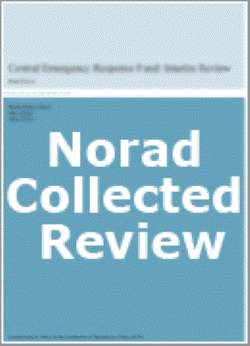Building Capacity for Development and Food Security in Malawi. Mid-Term Review of the Bunda College Capacity Building Programme (BCDP)
Om publikasjonen
- Utgitt: november 2009
- Serie: Norad-innsamlede rapporter
- Type: --
- Utført av: Ramji Nyirenda and Arne Tostensen
- Bestilt av: Norwegian Embassy in Lilongwe and Norad
- Land: Malawi
- Tema: Utdanning og forskning, Primærnæring (landbruk fiske skogbruk)
- Antall sider: 34
- Serienummer: 18/2009
- ISBN: 978-82-7548-456-5
- ISSN: --

The Project
Norway’s partnership with Bunda College of Agriculture in Malawi started in 1998. An evaluation in 2005 of the Norwegian support led to a split of the program into two main components. The review is looking at one of these, the Bunda College Capacity Building Programme (BCDP). The goal of the BCDP in this phase III, 2005 – 2010, is to enhance the performance of Bunda College as a lead institution in relevant and efficient learning, teaching, research and outreach for the agricultural and natural resources sector of Malawi and to enable the College to play a significant role in the development of the country. The BCDP is essentially an institution-building programme designed to put the College on a solid footing which is sustainable in the long run without external assistance.
Interesting Findings
- The capacity-building efforts during phases I and II are now bearing fruit. Bunda College has matured as an institution and there is no doubt that it has acquired a new degree of selfconfidence and become better prepared for the long sought-after outreach and application of technologies with a view to fulfilling its broader mandate.
- An indicator of institutional stability and functionality is Bunda’s low turnover of personnel. The very high retention rate (about 95 per cent) is a positive measure of institutional maturity and continuity.
- Library and ICT services have progressed significantly, although there is still scope for improvement. Concerns persist, however, about sustainability in the absence of donor funding. Major strides have been made in improving the infrastructure as far as buildings are concerned, partly with funding from the BCDP and partly from other sources such as the government and the Press Trust.
- It is commendable that a new research and consultancy policy has been adopted. As ameans of disseminating research findings consultancies afford an excellent opportunity to convey knowledge and technological skills. Consultancies are also a source of revenue for the College and its various units and thus contribute to financial sustainability, as well as provide supplementary income for academic staff, which serves as a retention mechanism.
- Two new PhD programmes are being mounted in (a) agricultural and resource economics and (b) aquaculture and fisheries in collaboration with the Regional Universities Forum for Capacity Building in Agriculture (RUFORUM). The selection of Bunda as the host for these PhD programmes is an indicator of confidence in its academic standing and quality of teaching. These two regional PhD programmes might develop into flagships for Bunda.
- A major ambition of Bunda College to transform itself from a constituent college of the University of Malawi to a fully-fledged university – Lilongwe University of Science and Technology – through a merger of three existing institutions of higher learning in the Lilongwe area has not materialised. The stumbling block appears to be the failure by Parliament to pass the new University of Malawi Bill.
- Bunda College has also failed to establish an endowment fund. The idea has been put in abeyance for the time being but not rejected as such. It would be worthwhile to revisit this proposal and to make an assessment of its feasibility. A functioning endowment fund yielding regular annual contributions to the College could form one of the pillars of financial sustainability.
- Bunda Farm was ‘commercialised’ in May 2005 and is now formally a limited liability company. The Farm which was previously a financial drain on the College appeared to have been on a recovery path but it seems to be in the red again. The Farm does not have title deed to the land, which is leased on a yearly basis from University of malawi as the formal custodian. Hence, the land cannot be put up as collateral and the government is unwilling to provide a guarantee. Therefore, credit institutions are reluctant to extend loans. This predicament hampers the farm’s profitability and prospects of Bunda College to earn an income from its shares. It is urgent, therefore, that a solution be found to the under-capitalisation of Bunda Farm Ltd.
- With regard to monitoring and evaluation (M&E) applicable to the college as a whole there are great improvements although there is still some scope for improvement.
- In terms of institutional sustainability a major challenge remains regarding the maintenance of assets such as buildings, computers and vehicles. The government provisions have increased but are erratic and still inadequate. There appears to be no systematic maintenance plan; repairs and maintenance measures are taken largely on an ad hoc basis as and when money is available. The College is in dire need of a comprehensive maintenance plan for all assets, including the costing of its implementation.
